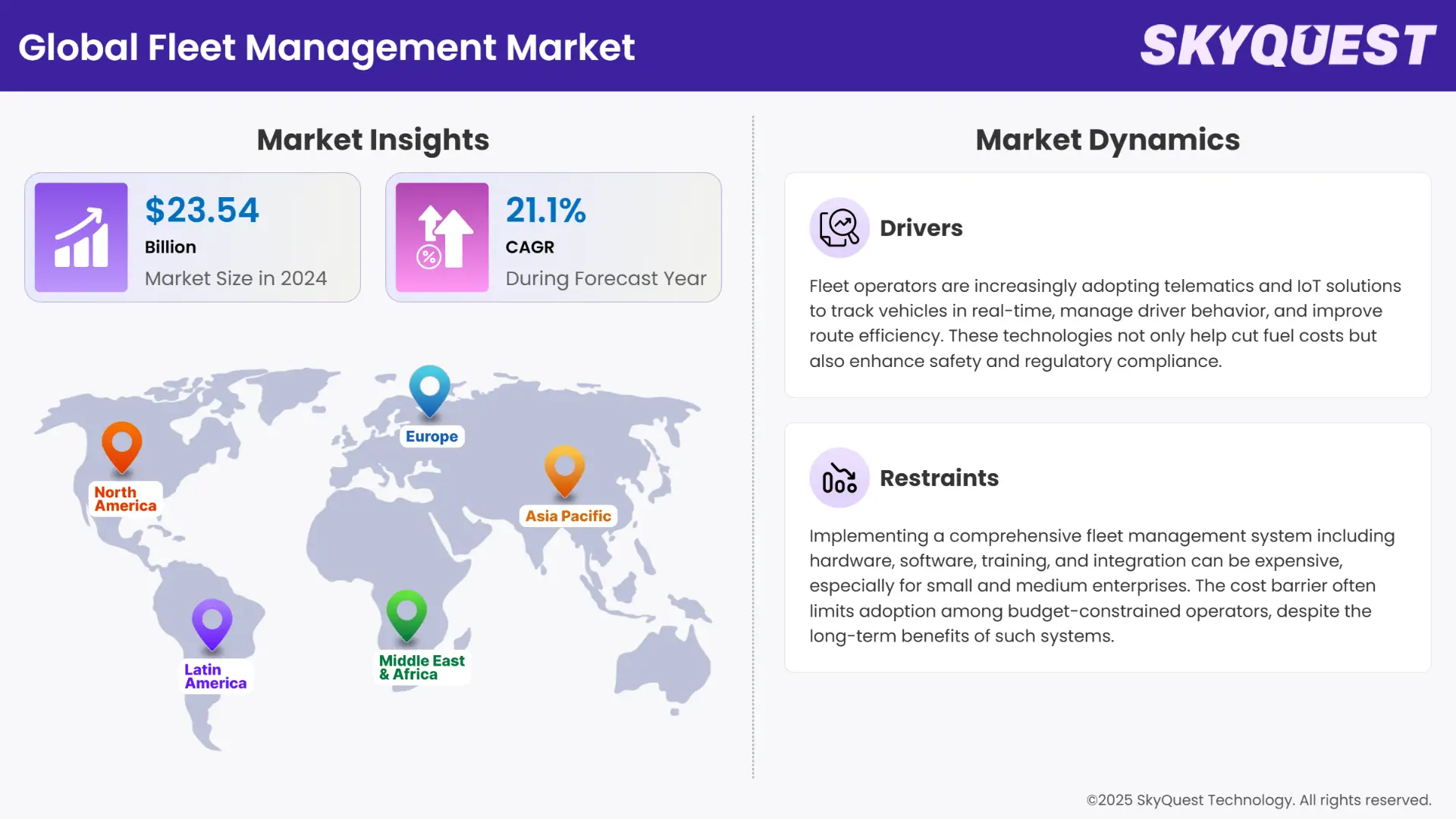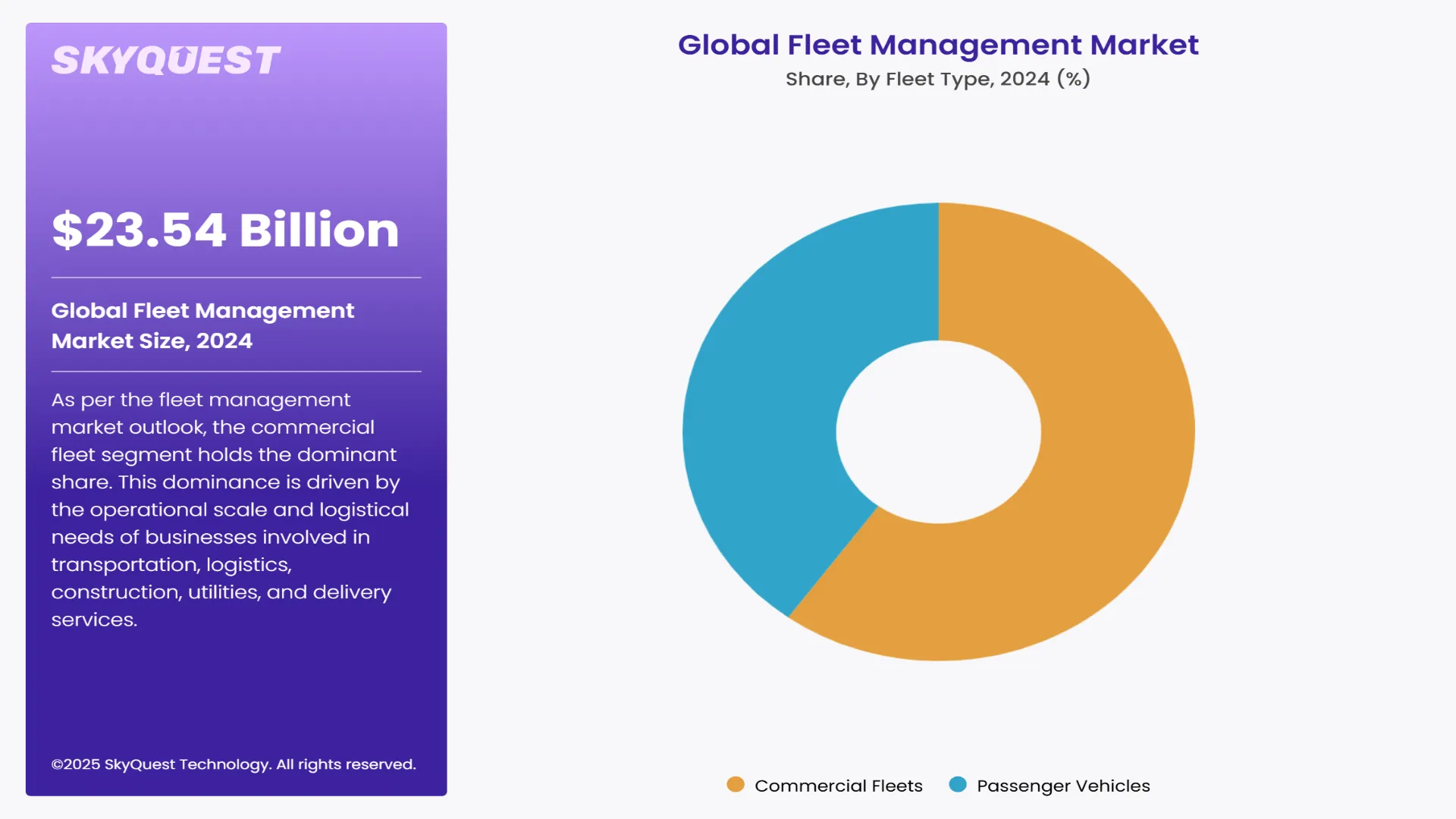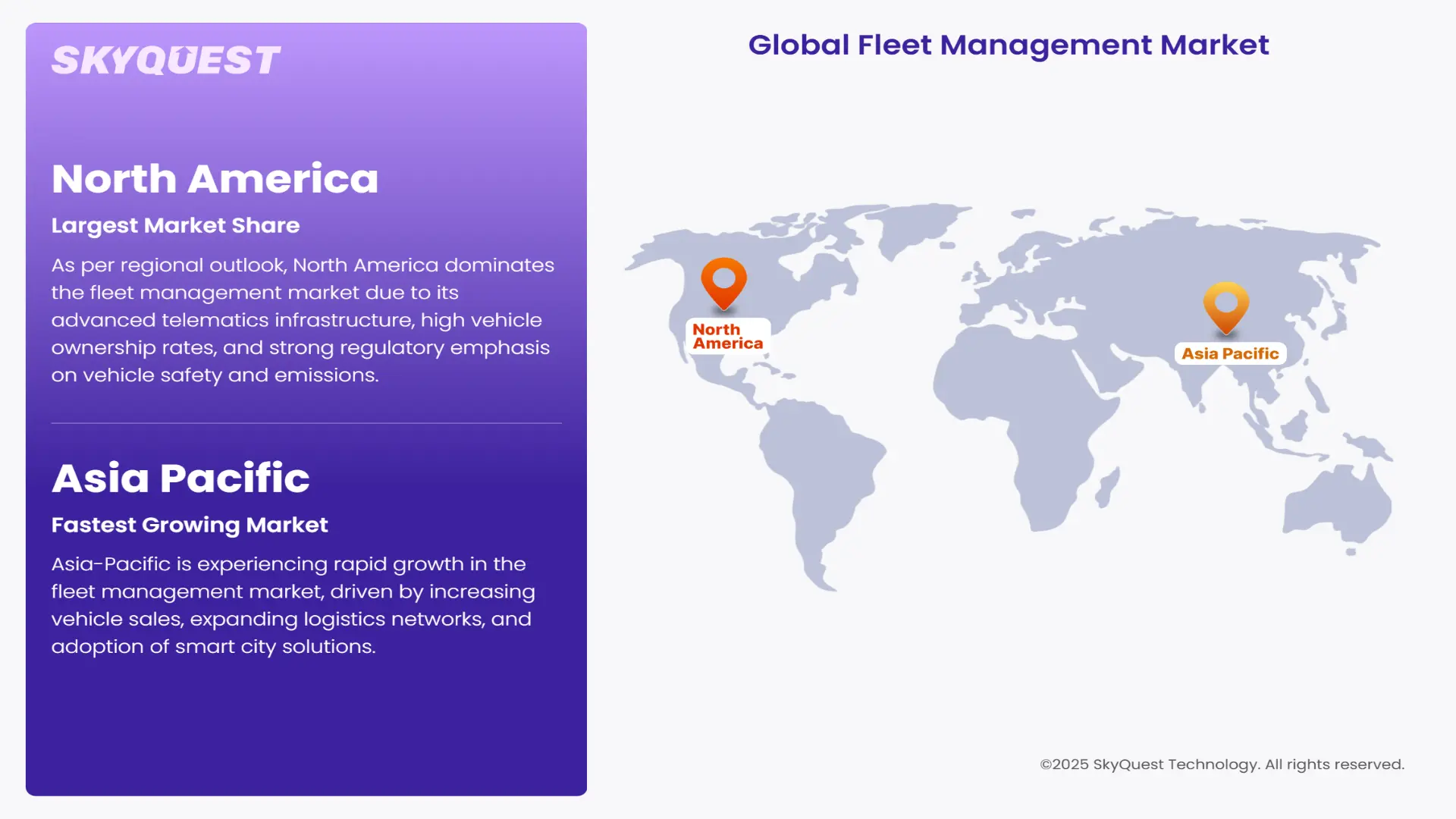
Report ID: SQMIG45F2146

Report ID: SQMIG45F2146
sales@skyquestt.com
USA +1 351-333-4748

Report ID:
SQMIG45F2146 |
Region:
Global |
Published Date: November, 2025
Pages:
173
|Tables:
94
|Figures:
68



Global Fleet Management Market size was valued at USD 27.84 Billion in 2024 and is poised to grow from USD 31.77 Billion in 2025 to USD 91.25 Billion by 2033, growing at a CAGR of 14.1% during the forecast period (2026–2033).
The fleet management market is undergoing a dynamic transformation due to the integration of advanced technologies such as IoT, AI, and telematics.The rapid progress of telematics, IoT, and AI analytics technology is bringing a treasure island of opportunities in the industry space for the fleet performance improvement and operations costs reduction.
The automotive sector has management software to track the health of the vehicle, driver behavior, and regulatory compliance. In the public sector, the government and those in the public sector have a stake in asset utilization and regulatory compliance, whether we are talking about emergency response vehicles or fleets in public transit. The industry is significant for route optimization, risk management, and fuel monitoring of the oil and gas industry to ensure optimal operation performance.
The interruptions in supply chain, consisting of the shortfall of labor, cause fleet maintenance difficulty. The driver shortage is a factor affecting fleet efficiency and quality of service. Products like gas price changes are some of the expenses Tricky which are added in the budgets therefore affecting the operational costs. In a competitive industry, businesses should pay attention to keeping the workforce, making the supply chain stronger, and managing the fuel costs effectively in order to continue with the normal operations.
Compliance with sustainability laws which is driving the fleet sector towards electric vehicles has meant that the companies now have to bear the additional costs at the beginning. The extreme weather brought about by climate change impacts fleet operations, thus the companies can face delays and maintenance problems.
How is AI Impacting the Fleet Management Market?
Artificial Intelligence (AI) is significantly reshaping the fleet management market by enabling real-time decision-making, predictive analytics, and automation across operations. AI-powered fleet solutions help companies optimize routes, monitor driver behavior, predict maintenance needs, and improve fuel efficiency. By analyzing vast amounts of data from vehicle sensors and telematics, AI allows for proactive responses that reduce operational downtime and enhance overall performance.

To get more insights on this market click here to Request a Free Sample Report
Global fleet management market is segmented into component, fleet type, vertical and region. Based on component, the market is segmented into solutions, services, support & maintenance and managed services. Based on fleet type, the market is segmented into commercial fleets and passenger vehicles. Based on vertical, the market is segmented into retail, healthcare & pharmaceuticals, construction, transportation & logistics, utilities, oil, gas, and mining, government and other verticals. Based on region, the market is segmented into North America, Asia-Pacific, Europe, Latin America, and Middle East & Africa.
As per the fleet management market outlook, the commercial fleet segment holds the dominant share. This dominance is driven by the operational scale and logistical needs of businesses involved in transportation, logistics, construction, utilities, and delivery services. Companies with medium to large-sized fleets depend heavily on fleet management systems to monitor vehicle usage, fuel consumption, driver behavior, maintenance schedules, and route optimization.
As per fleet management market forecast, the passenger vehicle segment is experiencing faster growth in the market. This growth is largely attributed to the expanding ecosystem of shared mobility services, corporate car rentals, government-owned transport fleets, and electric vehicle (EV) leasing programs. Fleet management solutions are increasingly being integrated into passenger vehicle fleets to ensure driver safety, manage vehicle health, track real-time data, and optimize routes especially in urban mobility settings.
As per the fleet management market outlook, the solutions segment holds the dominant share. Fleet management solutions include software platforms and integrated systems that offer real-time vehicle tracking, route optimization, driver behavior monitoring, fuel analytics, and compliance management. These solutions form the core infrastructure of fleet operations and are often the first point of investment for businesses looking to enhance efficiency, reduce costs, and ensure regulatory compliance.
As per fleet management market analysis, the managed services segment is witnessing the fastest growth in the fleet management market. As organizations shift towards outsourcing non-core functions, managed service providers are increasingly being entrusted with comprehensive fleet operations, including real-time monitoring, maintenance scheduling, compliance handling, and performance analytics. This trend is fueled by the need to reduce operational burden, especially for small and mid-sized businesses, and to leverage expert insights for more efficient fleet handling.

To get detailed segments analysis, Request a Free Sample Report
As per regional outlook, North America dominates the fleet management market due to its advanced telematics infrastructure, high vehicle ownership rates, and strong regulatory emphasis on vehicle safety and emissions. The region is also witnessing widespread adoption of electric vehicles (EVs) and connected mobility solutions. A mature transportation and logistics sector further fuels the demand for robust fleet management systems.
Fleet Management Market in United States
The U.S. is the largest contributor to the North American fleet management market. Factors such as large commercial fleet volumes, stringent Department of Transportation (DOT) regulations, and the presence of major market players like Geotab and Verizon Connect are key drivers. Growing e-commerce, especially Amazon's logistics expansion, is accelerating the demand for efficient fleet solutions.
As per regional outlook, in Canada, the growth is supported by the increasing need for cross-border logistics, government-backed sustainability initiatives, and the digitization of fleet operations among mid-sized logistics providers. Provinces like Ontario and British Columbia are actively promoting smart mobility solutions through partnerships and incentive programs.
Asia-Pacific is experiencing rapid growth in the fleet management market, driven by increasing vehicle sales, expanding logistics networks, and adoption of smart city solutions. The demand is particularly high for real-time tracking, route optimization, and fuel efficiency tools to cope with urban congestion and rising operational costs.
As per industry analysis, Japan is a technologically advanced market where fleet management solutions are integrated with AI, 5G, and IoT for real-time diagnostics and automation. The country’s strong emphasis on traffic safety, environmental regulations, and predictive maintenance is accelerating the adoption of sophisticated fleet management platforms.
South Korea is focusing on smart mobility transformation, with government support for autonomous and electric fleet development. The presence of advanced vehicle manufacturers and 5G-enabled infrastructure enhances the integration of telematics, boosting the demand for connected fleet management services.
Europe maintains a robust position in the fleet management market due to strict environmental regulations, high fuel prices, and the EU’s push for green and digital transportation. The region also benefits from cross-border logistics operations and strong adoption of Software-as-a-Service (SaaS)-based fleet platforms.
Germany is at the forefront due to its automotive excellence, export-heavy economy, and technological innovations. The country’s logistics and manufacturing industries heavily rely on fleet intelligence for cost reduction, predictive maintenance, and regulatory compliance.
The United Kingdom is seeing a surge in cloud-based fleet management and electric fleet integration, particularly in urban centers. Post-Brexit trade complexities have made fleet efficiency and compliance critical, driving the uptake of advanced fleet tracking and compliance tools.
Italy is focusing on greener transportation, especially in urban fleets. Cities like Milan and Rome are encouraging the adoption of low-emission fleets through policy incentives. Fleet operators in logistics and public transportation are increasingly adopting telematics to comply with EU emission standards.

To know more about the market opportunities by region and country, click here to
Buy The Complete Report
Surge in Demand for Real-Time Fleet Monitoring
Rising Emphasis on Operational Efficiency and Cost Reduction
High Initial Costs for Advanced Solutions
Data Security and Privacy Concerns
Request Free Customization of this report to help us to meet your business objectives.
The fleet management industry is highly competitive, with key players continuously innovating to gain a technological edge and expand their market presence. Companies like Geotab, Verizon Connect, Teletrac Navman, Samsara, Trimble Inc., and TomTom Telematics are at the forefront, offering end-to-end fleet solutions that integrate AI, IoT, and telematics for enhanced operational efficiency. These players compete on factors such as real-time analytics, integration capabilities, user-friendly interfaces, and scalability for both small and large fleets.
As per market strategies, in 2024, the competition intensified with strategic product launches and collaborations. For instance, in February 2024, Samsara partnered with Ford Pro, Ford’s commercial division, to integrate its cloud-based fleet management software directly into Ford’s electric and connected vehicle lineup.
In recent years, several innovative startups have entered the fleet management space, leveraging cutting-edge technologies to challenge established players and address niche market needs. These startups are focusing on AI, sustainability, electric vehicle (EV) integration, and data analytics to offer agile, cost-effective, and scalable solutions for diverse fleet operations.
SkyQuest’s ABIRAW (Advanced Business Intelligence, Research & Analysis Wing) is our Business Information Services team that Collects, Collates, Correlates, and Analyses the Data collected by means of Primary Exploratory Research backed by robust Secondary Desk research.
As per SkyQuest analysis, key drivers for market growth include the growing adoption of telematics and IoT. The increasing integration of telematics and Internet of Things (IoT) solutions is a major drive for the fleet management market. These technologies provide real-time tracking, vehicle diagnostics, fuel monitoring, and driver behavior analysis. As businesses seek to optimize route planning, ensure safety, and reduce fuel costs, the demand for connected fleet systems continues to grow. Telematics helps transform raw data into actionable insights, enabling smarter and more efficient fleet operations. The global fleet management market has a high rate of growth owing to factors such as technological innovations, efficiency pressures, and a need for eco-friendly and data-intensive transportation solutions.
| Report Metric | Details |
|---|---|
| Market size value in 2024 | USD 27.84 Billion |
| Market size value in 2033 | USD 91.25 Billion |
| Growth Rate | 14.1% |
| Base year | 2024 |
| Forecast period | 2026-2033 |
| Forecast Unit (Value) | USD Billion |
| Segments covered |
|
| Regions covered | North America (US, Canada), Europe (Germany, France, United Kingdom, Italy, Spain, Rest of Europe), Asia Pacific (China, India, Japan, Rest of Asia-Pacific), Latin America (Brazil, Rest of Latin America), Middle East & Africa (South Africa, GCC Countries, Rest of MEA) |
| Companies covered |
|
| Customization scope | Free report customization with purchase. Customization includes:-
|
To get a free trial access to our platform which is a one stop solution for all your data requirements for quicker decision making. This platform allows you to compare markets, competitors who are prominent in the market, and mega trends that are influencing the dynamics in the market. Also, get access to detailed SkyQuest exclusive matrix.
Table Of Content
Executive Summary
Market overview
Parent Market Analysis
Market overview
Market size
KEY MARKET INSIGHTS
COVID IMPACT
MARKET DYNAMICS & OUTLOOK
Market Size by Region
KEY COMPANY PROFILES
Methodology
For the Fleet Management Market, our research methodology involved a mixture of primary and secondary data sources. Key steps involved in the research process are listed below:
1. Information Procurement: This stage involved the procurement of Market data or related information via primary and secondary sources. The various secondary sources used included various company websites, annual reports, trade databases, and paid databases such as Hoover's, Bloomberg Business, Factiva, and Avention. Our team did 45 primary interactions Globally which included several stakeholders such as manufacturers, customers, key opinion leaders, etc. Overall, information procurement was one of the most extensive stages in our research process.
2. Information Analysis: This step involved triangulation of data through bottom-up and top-down approaches to estimate and validate the total size and future estimate of the Fleet Management Market.
3. Report Formulation: The final step entailed the placement of data points in appropriate Market spaces in an attempt to deduce viable conclusions.
4. Validation & Publishing: Validation is the most important step in the process. Validation & re-validation via an intricately designed process helped us finalize data points to be used for final calculations. The final Market estimates and forecasts were then aligned and sent to our panel of industry experts for validation of data. Once the validation was done the report was sent to our Quality Assurance team to ensure adherence to style guides, consistency & design.
Analyst Support
Customization Options
With the given market data, our dedicated team of analysts can offer you the following customization options are available for the Fleet Management Market:
Product Analysis: Product matrix, which offers a detailed comparison of the product portfolio of companies.
Regional Analysis: Further analysis of the Fleet Management Market for additional countries.
Competitive Analysis: Detailed analysis and profiling of additional Market players & comparative analysis of competitive products.
Go to Market Strategy: Find the high-growth channels to invest your marketing efforts and increase your customer base.
Innovation Mapping: Identify racial solutions and innovation, connected to deep ecosystems of innovators, start-ups, academics, and strategic partners.
Category Intelligence: Customized intelligence that is relevant to their supply Markets will enable them to make smarter sourcing decisions and improve their category management.
Public Company Transcript Analysis: To improve the investment performance by generating new alpha and making better-informed decisions.
Social Media Listening: To analyze the conversations and trends happening not just around your brand, but around your industry as a whole, and use those insights to make better Marketing decisions.
REQUEST FOR SAMPLE
Want to customize this report? This report can be personalized according to your needs. Our analysts and industry experts will work directly with you to understand your requirements and provide you with customized data in a short amount of time. We offer $1000 worth of FREE customization at the time of purchase.
Feedback From Our Clients